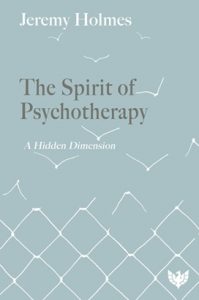
Professor Jeremy Holmes, MD FRCPsych, was for twenty-five years an NHS Consultant Psychiatrist in London and North Devon. Honorary Professor at the University of Exeter, he co-founded the Exeter masters, now doctoral, programme in psychoanalytic studies, and the psychodynamic professional qualification course. Author or co-author of over twenty books and 250 papers, he lectures nationally and internationally. Now largely retired, he maintains a part-time private psychotherapy practice alongside grandparenting, allotment gardening, and Green politics.
Jeremy’s latest book The Spirit of Psychotherapy: A Hidden Dimension is based on in-depth interviews with people from a wide range of faith backgrounds and highlights the role that belief and spirituality play in everyday lives.
Psychotherapy and counselling are integral to contemporary life. In the world of mental illness, psychotherapy is the treatment of choice for mild to moderate depression, anxiety, eating disorders, addictions, and personality difficulties. In the public arena, we are outraged to learn that suicidal children have to wait up to 2 years to see a counsellor. Soldiers and the police are routinely offered counselling to help cope with the terrors and trauma of their working lives. Couples in trouble need family therapy if their children are to flourish. Therapy helps people cope with the inevitabilities of loss and bereavement.
Jeremy Holmes is known for his clear and jargon-free expositions of psychoanalytic ideas and passionate advocacy of attachment theory as a scientific psychotherapy paradigm. In this new and seminal text he argues that, beyond evidence-based practice, there is a latent dimension to the practice and social role of psychotherapy and counselling, which he calls ‘secular spirituality’. Drawing on ideas from Bowlby, Winnicott, and the neuroscientist Karl Friston he argues that, in an age of disenchantment, psychotherapy now occupies the space vacated by religion.
In the Western world, identity is increasingly defined by consumerism, physical appearance, victim status, and digitised self-advertisement. In parallel, there has been an emptying out of inner life and a sense of loss of meaning. This ontological insecurity drives a hunger for a realm beyond utilitarian exchange. With vivid case examples and cogent argument, Holmes shows how the praxis of psychotherapy fills this spiritual vacuum, offering an intense relationship that transcends exchange value, a geography of the inner world, and helping to build a more organic sense of self-in-relation-to-others.
But the role of psychotherapy is Janus-faced. In its solution-focused ‘wellness’ guise it can reflect and reinforce the very social values of hyper-individualism that bring its clients for help. On the other hand, by opening up an alternative social space untrammelled by instrumentalism, it challenges the prevailing culture. Thus, the widespread practice in medicine and social work of ‘hot-desking’, and sidelining the specificity of the client–practitioner relationship contradicts the spirit and science of attachment. Rather than reducing demand, lack of continuity of care underpins medical recidivism.
We live in a world of radical uncertainty, mitigated to the extent we can seek out and maintain a relational, social, and ecological secure base. Uncertainty is especially problematic for those suffering with psychological illness, whose developmental experiences have been chaotic and loss-ridden and whose current lives often repeat these patterns. Spiritualised psychotherapy responds to this uncertainty and the ‘free energy’ associated with novel experience, along two dimensions: a) by creating transitional space in which, via relationship with the ‘borrowed brain’ of the therapist, the free play of the imagination is liberated; b) within this space, co-creating new and more salient top-down models with which to understand oneself and one’s experience.
Religious spirituality helps people move from self-preoccupation to engagement with the world; ensures that they are part of a group; balances egotism with altruism and compassion; instils a sense of trust; and validates awe. In the secular spiritualized practice of psychotherapy, therapists aim to cultivate non-ego states in themselves; to adopt a compassionate and reverential respect for the present moment; to acknowledge and encompass the client’s environmental connections, human and ecological; to attend to their own and their client’s bedrock existential experience; from challenge and disorganisation to discover new truths; and to forge a self-reflective language and narrative both definitive and partial. In his moving final chapter, Holmes illustrates these precepts with a detailed account of his own preparations for and practice within a psychotherapy session.
This brief, readable, and original book is suitable for all psychotherapists and counsellors – as well as the non-dogmatic religiously minded – who, as they should, question what they are doing, and why. It makes a powerful case for psychotherapy as the necessary connective tissue that can help repair and hold together our increasingly fragmented and fissured sociocultural world.
Jeremy Holmes
The Spirit of Psychotherapy: A Hidden Dimension is due to be published in July 2024.

